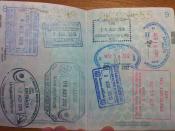Self-determination for national minorities is a topic that has been debated about for centuries in various countries. The definition of self-determination is the determining by the people of the form their government shall have, without reference to the wishes of any other nation, esp. by people of a territory or former colony. There are various other definitions for the word and the way that each of them have been perceived or translated are various in different countries or with different nations. There have also been many examples around the world of self-determination. It is a very hotly contested topic because of the implications that it carries to many people and states in general. Self-determination has caused several countries around the world to break up. There are various factors for it and some of them would be because of religion, nationality, race etc. But countries do not always break up due to self-determination by certain groups and instead have the groups work with the government in order to better understand the topic and the impact that it has on people.
Some examples of the self determination issue would be of the Kurds in Iraq and Turkey, the Quebecers in Canada, East Timorese in Indonesia etc. There have been various outcomes for each of the issues and the ways that they have been approached have also been very different. The country that has been chosen for this case study is Spain and they themselves have had problems with a group known as the ETA, who fights to gain self-determination for the Basque people in north-western Spain. In this essay, the Aboriginals and Quebecers of Canada and the Basque people of Spain will be used to compare the self-determination for national minorities and the ways that the governments of the respective countries have...


